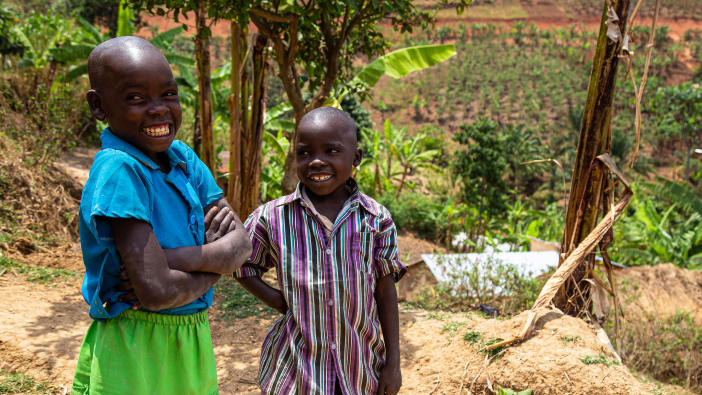Putting power into girls' palms: a story about strength in small things
Sometimes, something as small and practical as a clean sanitary towel can be the key to escaping a cycle of poverty.
Written by Tarryn Pegna | 07 Oct 2020



Written by

Written by Tarryn Pegna
‘Be faithful in small things because it is in them that your strength lies.’ (Mother Teresa)
The smallest things can make the greatest difference. Little life details have the potential to bring – or remove – great strength. Perhaps the small things Mother Teresa was talking about are our thoughts, our choices, our everyday actions and interactions – our moments spent in prayer in the midst of the giant storms of life. But what she was saying has a wider truth in it.
Sometimes, the small things that can make or break an entire life, future, generation or community, are immensely practical items. A clean sanitary towel, an item small enough to put in the palm of a girl’s hand, can be the difference between her getting an education, or getting none. The difference between her being able to get a job, or being trapped in poverty. The difference between her having dignity, or experiencing shame.
Meet 17-year-old Takudzwa.
‘My name is Takudzwa. I live in Ngangu township [in Zimbabwe] – a famous location which was the epicentre of Cyclone Idai.
‘Our lives were devastated during and after the cyclone. It took time to recover and the disturbing thing about being a girl was the lack of basic sanitaryware to manage our menstruation during the disaster.
‘My mother and father separated when I was nine years, and I grew up with my mother. We lost all our clothes during the cyclone, and it was difficult for us girls to manage our menstrual hygiene. The cyclone did not give us a chance to gather our few belongings as it hit us during the night. We were left with only the clothes that we were wearing.’
Cycles of poverty
Part of the biology of a young woman’s development is the body’s preparation to try to make space for the creation of a new human being. With that, though, comes a whole world of very specifically female pain.
The physical discomfort of monthly cycles – which can be anything from mild to debilitating. The emotional and physical pain associated with having, or indeed not having, babies. Each woman’s experience is slightly different, and yet, in many ways, essentially the same. For most girls and women, from some point in their adolescent years, there will be regular periods of time in which having access, or not having access, to all the things necessary for good menstrual hygiene will have a significant impact on their freedom.
For Takudzwa, as for many other women and girls in the world affected by disaster, conflict or poverty, not being able to get sanitary products and clean clothing further strips them of any comfort and dignity in their already difficult circumstances.
‘We felt excluded before [Tearfund partner] ZOE came in with the support,’ she says.
Takudzwa tells how, in her situation, school attendance was interrupted. Before they were able to receive sanitary hygiene kits from ZOE, most of the girls couldn’t go to school during their period.
‘‘It feels good to see people expressing their care and love through the support. Human dignity is upheld and you feel motivated.'’
Absorbing shame
Not being able to afford sanitary products can remove young women from lessons every month, damaging their education, reducing their opportunities, and making it harder to build futures for themselves which will lift them out of poverty or bring them confidence.
Losing confidence, feeling shut out, and not being able to deal hygienically with their monthly periods, no matter where they are in the world, brings to girls a sense of shame around being a woman – especially for those experiencing their first menstruation. This can feed into dangerous vulnerabilities within societies toward sexual and gender-based violence. Through all of these things, it limits the God-given potential these girls have within them to succeed and thrive.
Trapped in a cycle of shame, indignity and poverty – all for want of a sanitary towel.
Strength in small things
Fortunately for Takudzwa, thanks to the generous giving of Tearfund supporters, our local partner organisation was able to provide her, and many other girls and women in her community, with hygiene kits and training in how to maintain good menstrual hygiene.
‘I am happy that the lessons we received emphasised the need to stand up for our rights and be bold and courageous to report any abuse being experienced by girls,’ enthuses Takudzwa. ‘Girls also need to be empowered, so that they are aware of their potential and that they are equally important as boys.’
We couldn’t have said it better.
Please pray
Dear God,
Thank you for each girl and woman you have created. We praise you for the wonder and power and potential you placed inside each one. We pray for protection and provision and possibility for each woman and girl around the world. We lift up, particularly, those affected by poverty, conflict and disasters. We pray for hope, and that they will have the futures and the good works that you created for each one of them to do when you designed them in your perfect plan.
God, help us to be champions of women and girls. May we build them up, give them a voice and protect them wherever they are.
In Jesus’ name,
Amen.
Similarly Tagged Content
Share this page
Share this page to spread the word and help support those in need.

Get our email updates
Learn about our work and stay in touch with Tearfund. Hear about our news, activities and appeals by email.
Sign up now - Get our email updates






